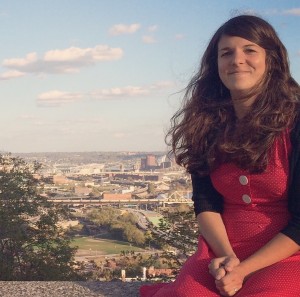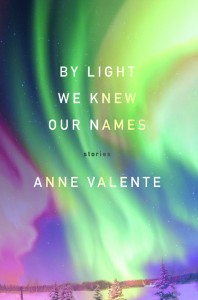Interview: Anne Valente
 Midwestern Gothic staffer Hannah Bates talked with author Anne Valente about her collection By Light We Knew Our Names, realism versus fabulism, what attracts her to short fiction, and more.
Midwestern Gothic staffer Hannah Bates talked with author Anne Valente about her collection By Light We Knew Our Names, realism versus fabulism, what attracts her to short fiction, and more.
**
Hannah Bates: What’s your connection to the Midwest?
Anne Valente: Though I’ve lived in Ohio for the past couple of years and also did my MFA here at Bowling Green State University, I grew up in St. Louis and still feel the Midwestern pull most acutely from my childhood and adolescence there. It’s a place that I visit as often as possible, to see my family but also to revisit a city I love inordinately.
HB: Your collection of stories, By the Light We Knew Our Names, blends realism and fabulism. How are you able to do this successfully? Is there a place for these two opposite genres to coexist in fiction?
AV: My hope is that they coexist successfully in the collection due to the lens through which realism is viewed: regardless of whether a story includes magical elements, I hope that a sense of the world’s inherent magic permeates the book. I consider magic in fiction to be not only magic realism and fabulism but also sorcerous sentences, curious syntax, and uncovering the oddities and strangeness of our very real, very mysterious world. For this reason, I didn’t think too hard about whether each story was fabulist or realist. I appreciate a blurring of boundaries in fiction between real and not-real, and I hope these seemingly opposite sensibilities can coexist in fiction as well.
HB: What are your favorite elements of magical realism to include in your work?
AV: More and more, I’m interested in magical realism that builds upon the natural world. There’s so much that is strange to me about our planet and universe – that Saturn has so many moons and every one of them so unimaginably far away, that octopuses have three hearts, that the starlight we see is hundreds of years old and just reaching us now. For me, it isn’t much of a leap to create magical fiction from just how extraordinary this world can be.
 HB: You grew up in St. Louis and have used the city as a setting in your story, “Tell Us You Were Here,” which will appear in the forthcoming May issue of One Story. Why do you both consider and not consider yourself to be a Midwestern writer?
HB: You grew up in St. Louis and have used the city as a setting in your story, “Tell Us You Were Here,” which will appear in the forthcoming May issue of One Story. Why do you both consider and not consider yourself to be a Midwestern writer?
AV: That’s a great question, and one that I’m still piecing out. I guess I’ll address the not first: I think regional writers are understood to be those who write exclusively about a specific region, and though I’ve been writing a great deal about St. Louis lately, I don’t foresee continuing that trend for my next projects. I’m interested in writing about the Midwest but also about other places, situations, locales, world events. However, I do consider myself a Midwestern writer because I’m very proud of where I’m from. There’s so much here, and being from the Midwest, I never would have even thought that the most interesting things in fiction happen elsewhere – on coasts or in other countries or in America’s biggest cities. I’m just as interested in writing about the Midwest as I am in writing about other places, if not more so. But first and foremost, I consider myself a Midwestern writer because of the way that growing up here has so deeply influenced my sense of sound and rhythm. I think the soundscape I grew up with – thunderstorms and cicadas and Midwestern highway hums – have embedded themselves in the sound of my fiction. So whether I’m writing about the Midwest or a completely different place, that sense of acoustics is rooted in who I am as a writer.
HB: What attracts you to short stories?
AV: I like that stories allow me the excuse to indulge my curiosities, of which there are many. Novel projects are great for delving into a topic in depth, but stories are an excellent means of tackling even more topics for shorter periods of time. Whether interesting histories, strange facts, particular personalities or specific landscapes, short fiction provides me the opportunity to really delve into a fascination before something new comes along to occupy my interest.
HB: Your debut novel, Our Hearts Will Burn Us Down, is due out in 2016. Are there elements of the Midwest represented in your the novel?
AV: Absolutely. The novel is set entirely in a suburb of St. Louis that has been broken apart by a mass high school shooting. Though the shooting and its aftermath take the forefront of the novel, the Midwestern setting is paramount. I wanted to revisit St. Louis for the length of a novel, but even more so, I wanted to explore a Midwestern sense of community and how it shifts and bends beneath the weight of grief.
HB: How has the process of writing a novel surprised you? Have there been major differences in the process of crafting a novel as opposed to a collection of stories?
AV: In contrast to writing the stories in By Light We Knew Our Names, which had many eyes on them across the years of putting together a collection – through trusted colleagues, workshops or even through publication – the process of writing a novel definitely turned me into a lone wolf. No one saw the draft at all until it was complete, and even then, only three people read it (and one of those people was my husband). I worried that if someone read it before it was done, I would be completely derailed. I needed to get it out in one concentrated burst of year-long writing before anyone saw it. Novel-writing is also a lot of time alone just plodding, plodding even more, and mapping everything out in big, visual diagrams. At times it was isolating and frustrating, but there’s also something satisfying about the marathon and making your way.
HB: You have received many honors and awards, which include winning the Dzanc Books Short Story Collection Competition and several Pushcart Prize nominations. When did you first consider yourself to be a successful writer?
AV: I don’t know that I’ve ever really thought of myself as a successful writer, but I can definitely pinpoint when I began to think of myself as a professional. After I finished my MFA program, I was working full-time with a very heaving teaching load and knew that if I was going to get any writing done at all, I’d need to schedule the time and stick to it. That’s when I began to think of myself as a professional writer. Since then, I’ve stuck to a routine of getting at least 500 words written a day (or 1000 in the summer when I’m not teaching). Not every word ends up being useful, but writing is my job – just like any other job. Because it’s my job, I treat writing like I would any other profession in terms of spent time.
HB: You recently visited Ann Arbor, Michigan, for the Voices of the Middle West festival hosted by Midwestern Gothic and the University of Michigan’s Residential College. As one of the panelists for the Midwestern Fabulism panel, what advice can you give to those who aspire to write in the genre but don’t know where to start?
AV: Voices of the Middle West was truly an amazing conference and weekend – thank you again to everyone at Midwestern Gothic and the University of Michigan’s Residential College for such an impressive festival celebrating Midwestern writing! I’m honored to have participated on the Midwestern Fabulism panel with Matt Bell, Alissa Nutting, Laura Kasischke, and Elizabeth Schmuhl, and to have the chance to hear everyone say such smart things. For those starting out with Midwestern magic, I’d say pay attention to what’s magical and strange about your specific corner of the Midwest. Whether it’s an odd piece of history or town legend, or whether it’s the eerie way the wind whistles in spring or how the rain blankets the windowpanes during storms, there’s magic in the details – and in the particular details of a certain town or city. For me, Midwestern magic is setting, and it’s also local history, legend and custom.
HB: What’s next for you?
AV: While working on the novel, I wrote a string of St. Louis stories to unstick myself in the drafting process, and also to get more rooted in the novel’s Midwestern setting. Now that the novel is complete, I have ten short stories about different aspects of St. Louis history, culture, flora and fauna, so my plan is to round of a new collection of short fiction. I hope to start a new novel later this year too. I’m also readying to leave the Midwest for Santa Fe, where I’ll be joining the creative writing faculty at Santa Fe University of Art and Design this fall. Though I’ll undoubtedly bring along my Midwestern sensibility of soundscape, I’m looking forward to exploring a new landscape with its own rhythms and a rich setting for fiction.
**
Anne Valente is the author of the short story collection, By Light We Knew Our Names (Dzanc Books, 2014), and the forthcoming novel, Our Hearts Will Burn Us Down (William Morrow, 2016). Her fiction appears in One Story, Ninth Letter, Hayden’s Ferry Review and The Normal School, and her essays appear in The Believer and The Washington Post.






